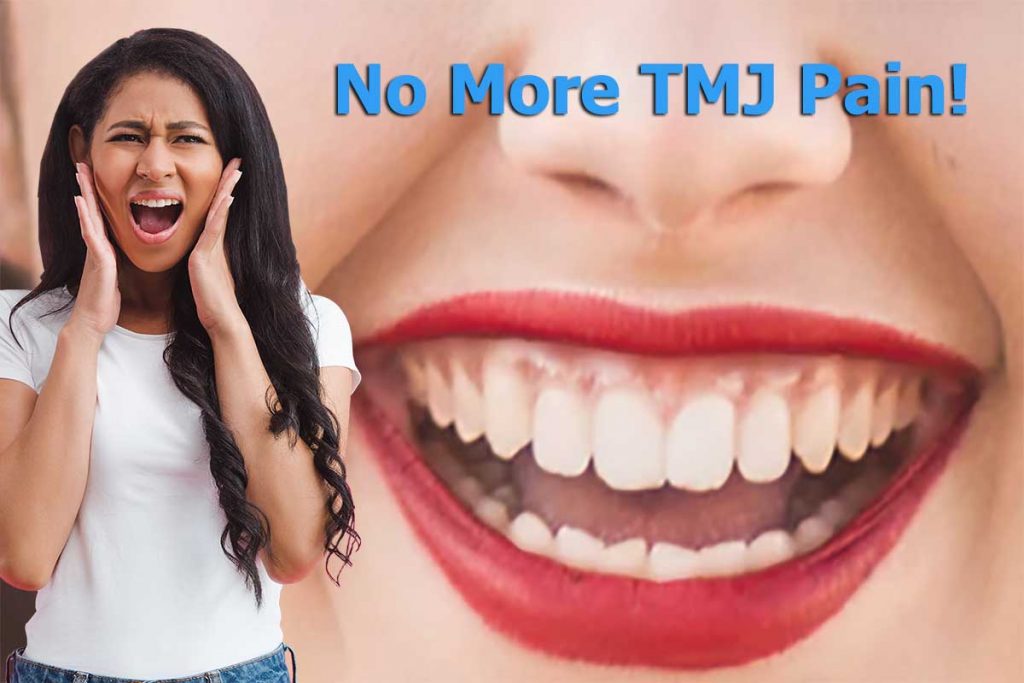Ever feel like your mouth is stuck opened or closed, or your jaw doesn’t want to cooperate as it should? Do you suffer from jaw joint pain? Many people experience both, and it could be a sign of what is referred to as TMJ. The more you know about TMJ, the more you will be able to help determine if it could be the source of your pain, and then seek the right treatment for it!

Many people who experience severe jaw joint pain have a TMJ condition. TMJ stands for temporomandibular joint, which is the joint that hinges the jaw together on both sides of the face, just below the ear. Although TMJ stands for the joint itself, people usually refer to the term to also describe problems associated with it. Others use TMD, to refer to temporomandibular joint disorders. Since TMJ is the term most of my patients are familiar with, let’s refer to TMD, TMJ and TMJD all as “TMJ” for the remainder of the article. Fair enough?
TMJ Defined
The pain and disorders that people experience with the TMJ happen between the ages of 20 to 40 are more common in women than in men and can be the source of extreme pain and discomfort.
The pains that people often feel that are associated with TMJ can be a pain in the face, earaches, headaches, clicking or popping sounds when opening and closing the mouth, and tenderness of the jaw. Those clicking and popping sounds that the jaw may make are not always accompanied by pain; sometimes the noises are there, but there is no discomfort present. Also, people may have difficulty chewing, biting, or being able to open their mouth. Some people may experience a feeling of their jaw being locked or stuck in the open or closed position.
TMJ problems, according to the National Institutes of Health, are brought on by specific structures being stressed. Those structures include the muscles of the neck, face and jaw, nearby ligaments and blood vessels, teeth, and the cartilage disk located at the joint.
Even though stress to these areas is believed to be a cause for many of the TMJ cases that are identified, there are still many other cases where a cause has not been identified. Some people believe there are additional factors that contribute to TMJ, including a bad bite, tooth grinding, and poor posture while sitting at the computer.
In addition, some factors are believed to make TMJ worse, such as not getting enough sleep, having a poor diet, and being stressed out.

Diagnoses and Treatment
If you feel you may have TMJ after learning about the symptoms, or you would like to be evaluated for it, the first step is to meet with an orthodontist. The orthodontist will perform an exam to help determine if you have TMJ, including reviewing bite alignment, feeling the joint and head for tenderness, sliding the teeth from side to side, analyzing the opening and closing of the jaw, and an x-ray or MRI. In order to determine if there could be any abnormalities in the area.
Depending on the orthodontist that you see, there are a variety of routes for treatment. So the good news is that they will be able to help you find relief if you are indeed suffering from TMJ. The various types of surgeries for the disorder include relaxation therapies for the jaw, avoiding things like chewing gum, using cold or heat packs, learning to de-stress, and increasing weekly exercise.
In addition and depending on the severity, you may also be prescribed medication to help alleviate the pain and reduce any swelling. Sometimes TMJ patients are also given devices such as splints and mouth or bite guards to help address the issue,
Moving Forward
While we may not be able to pinpoint one thing that leads to TMJ accurately, it is believed that there are things that happen in life that can lead to it more than others. Those who may have been hit or even involved in car accidents may begin to experience the symptoms. Before you know it, you could have the pain and discomfort in check and be back on your way to pain-free smile!
Visit NIKA DENTAL CENTER where they provide complete family dental care under one roof. You receive quality treatment in a safe environment and in a manner designed to suit your level of comfort. With more than 16 years of experience and expertise in family and cosmetic dentistry, their team is committed to restoring, protecting and improving the oral health of its patients.



